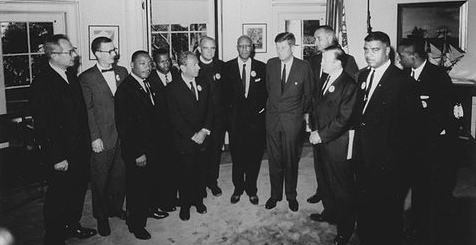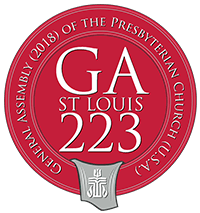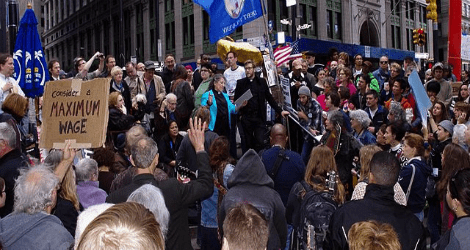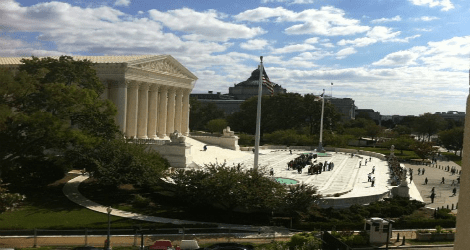 View and print as PDF
View and print as PDF

Several years ago, in 2006, we celebrated the one-hundredth anniversary of Eugene Carson Blake’s birth (Nov. 7, 1906). In 2008, we honored another Centennial, that of the Social Creed of the Churches, born in 1908 at the founding of the Federal Council of Churches (see Appendix A). I link these two events because of Blake’s dual commitment to ecumenism and to social progress, especially in race relations. To remember Blake is to remember his formal leadership as President of the National Council of Churches (successor of the Federal Council) and, later, General Secretary of the World Council of Churches, and his leadership by vision, as in the December 1960 proposal for church union among the four most “mainline” Protestant churches. To remember the Social Creed of 1908, and create a new Social Creed for the 21st Century, is to strengthen ecumenical Christian witness and action today.
___________________________________________
“Treason and dissent are being confused. The shrine of conscience and private judgment, which God alone has a right to enter, is being invaded.” – from Letter to Presbyterians,
referring to McCarthyism
___________________________________________
Blake was an elected, elective, and enormously effective ecumenical leader. Personally attractive in dynamic and characteristically “American” ways, the core of his leadership was its ethical Christian witness. To be a Christian was to stand for justice, which meant in practice, to support social progress. In this, he embodied the theological consensus of neo-orthodoxy, generally consistent with both Karl Barth and Reinhold Niebuhr, though his earliest views were formed by his socially conscious, yet theologically conservative, Republican parents. R. Douglas Brackenridge, in his biography, cites Blake’s motto: “ministers must risk being wrong rather than to be silent and safe.” Blake applied this to the whole church and was found, from the 1930s to the 1970s, to be right, at least among a solid majority of Presbyterians and other ecumenical Christians. Because Blake had the content, character, and clear Christian conviction, he was able to move the church to meet God’s Spirit in the world. And in the World Council, he was able to maintain a high degree of consensus even as liberation theology came to challenge neo-orthodoxy’s approach to Christian social involvement.
Others can speak to additional aspects of Blake’s leadership as pastor, Stated Clerk of the Presbyterian Church, and General Secretary of the World Council of Churches. That he could preach and had something to say is clear. What I will argue here is that his leadership power was based not only in personal charisma, but in the prophetic claim that resonates in every convicted Christian heart. In terms of the three traditional offices of Jesus Christ—Prophet, Priest, and King—this man, known often as the “Protestant pope,” may remind us how crucial the prophetic dimension is to any “kingly” leadership in the church. Platforms like the Social Creed express that prophetic element: visionary leaders like Blake find and make opportunities to call the plays, rally their teams, and move the ball.
___________________________________________
“According to the new philosophy, if what is true ‘gives aid and comfort’ to our enemies, it must be suppressed. Truth is thus a captive in the land of the free. At the same time, and for the same reason, great words like ‘love,’ ‘peace,’ ‘justice,’ and ‘mercy,’ and the ideas which underlie them, are becoming suspect.” – from Letter to Presbyterians
___________________________________________
False prophets may mobilize the “warrior” energy—which Princeton University football player Blake always had—but do not combine it with the ordering and blessing functions of mature (kingly or queenly) leadership. The ordering function is larger than giving orders, and needs the prophet’s vision of a better divine order. I would go so far as to say that Blake succeeded because he was a “minister in full” (to adapt Tom Wolfe’s “man in full” phrase): he served as a priest, embodying God’s love and sacrifice as a pastor; he was always a wise teacher (this rabbinic function was also Jesus’ base); he had the prophet’s courage to challenge the powers (of McCarthyism as well as racial, religious, and economic bigotry); and then he had the confidence and competence to carry the representative work of leadership, expressing the hopes and purposes of a whole community. In terms of the Jungian Christian psychology of Robert (not Thomas) Moore, Blake had the four quadrants: Warrior (for justice, prophetic vision), Magician (teacher-making tradition come alive), Lover (pastor, up-builder, connector), and King (pre-eminent representative, orderer, orchestrator of public blessing events).
In summarizing Blake’s leadership strengths, I do not mean to deify or beatify him. When I met him a couple of times in the Princeton Seminary chapel in the late 1970s, when he came down from Connecticut for the board meetings, I saw a kindly, older man, somewhat stooped. Princeton’s President, James McCord, introduced me to him, perhaps assuming I knew more of their background together than I did. Blake was at that time still on the Bread for the World masthead, having led that Christian citizens’ organization after his defeat for Moderator of the Presbyterian Church upon his return from the WCC General Secretary post. I may have known about that miscalculation, but I did not know until reading Brackenridge’s Eugene Carson Blake: Prophet with Portfolio (Seabury, 1978), that Blake had checked his famous Church Union sermon with Jim McCord prior to its delivery. This is to say, Blake made mistakes, was not always a perfect administrator (according to Brackenridge), but generally knew who to work with and depend upon within the larger church.
___________________________________________
“A still greater obligation is to make sure that what we mean by security, and the methods we employ to achieve it, are in accordance with the will of God. Otherwise, any human attempt to establish a form of world order which does no more than exalt the interest of a class, a culture, a race, or a nation, above God and the interests of the whole human family, is foredoomed to disaster.” – from Letter to Presbyterians
___________________________________________
In terms of the content of Blake’s “social creed,” I would again stress that he and his family were not part of the “Social Gospel” movement that inspired the 1908 social creed. The recent efforts that created an ecumenical Social Creed for the 21st Century broadened the original creed’s primarily economic focus to include the peace and racial justice issues for which Blake is justly known. But in an address Blake delivered in 1966, “Militant Faith—A Word to Conservatives,” see how much economic and social awareness—and what we now call “globalization”—inform his list of key issues:
Population explosion—all over the world. What do we do to feed, house, and organize the life of [humans] whose numbers are growing by geometric progression?
Urbanization. How do we keep human life human and humane, when [we] are more and more packed into high-rise apartments in bigger and bigger cities?
Technological Unemployment. How do we find jobs for everybody when programmed machines do so many things better? And how do we use the leisure that machines make possible?
Depersonalization. How do we avoid becoming merely numbers in a machine?
Cybernetics. Who is to program the machines and with what values?
Nuclear war. How do we prevent it and how can we find ways to promote peaceful change?
The shrinking world. What does it mean that on radio we can hear and on television we can see immediately anything of importance wherever it happens?
Interdependence. What does it mean to be dependent for life itself on electricity or rapid transit or good labor relations?
Pluralism. How can you reconcile necessary tolerance with vital convictions?”
What Blake goes on to provide are several “aspects of our American heritage that I believe all Christians ought to join in defending [greatly edited here]:
- Equality, especially equality of opportunity…
- …responsible individual freedom….
- …individual enterprise…voluntarism in business, in social concern, and in government….
- …government of, by, and for the people …(and its)…institutions of freedom…”
(Blake, The Church in the Next Decade, New York: Macmillan, 1966, p. 22, 25)
A much longer treatment of Blake’s work on racial issues, from his arrest integrating an amusement park in Baltimore to his integrating the Office of the General Assembly, might be given. Similarly, an assessment of his views on church and state, from his fight with McCarthyism to his statements on Roman Catholicism in public life, could be very helpful. He dealt forthrightly with what he called the “totalitarian” officially Communist regimes of the Soviet Union and China, pushing for the inclusion of Eastern Orthodox Church representatives in the World Council (which also welcomed many Third World churches during his tenure as General Secretary). He confronted South African apartheid and addressed poverty as a more general challenge to faith (Brackenridge’s book does not deal much with Blake’s encouragement of the Confession of 1967’s preparation).
___________________________________________
“There should be no reluctance to employ the conference method to the full in the settling of disputes with our country’s enemies. Let us beware of the cynical attitude which prevails in certain official circles to regard as a forlorn hope any negotiated solution of the major issues which divide [hu]mankind. Direct personal conference has been God’s way with [humanity] from the beginning. ‘Come, now, and let us reason together,’ was the word of God to Israel through the Prophet Isaiah.” – from Letter to Presbyterians
___________________________________________
Overall, a key to Blake’s witness was its forward-looking character: his orchestrating themes of the Uppsala Assembly in 1968 (motto: “Behold, I make all things new”), like his helping orchestrate many creative General Assemblies, showed his shrewd sense of emerging needs and ways the church should address them. In a way, this reflects what Brackenridge indicated was Blake’s sense in moving from the influential Albany, NY pulpit to growing Pasadena, CA, that he was moving to where the future was more present.
During Blake’s years as Stated Clerk (1951-1966), he repeatedly stood for measures to put into practice the social teachings and social witness policy of the church in what he took to be a revolutionary time. Again, this could be a much longer paper to deal with that topic. For perhaps the clearest statement of the church’s own leadership in society, however, the first four paragraphs of the 1953 Letter to Presbyterians, issued by the General Assembly Council, should be read carefully. Here Blake’s co-author of most of the rest of the document, President John Mackay of Princeton Seminary, had been directly attacked by one of Senator McCarthy’s associates as a “communist.” This was on top of repeated far-right claims that the Protestant clergy included hundreds of Communists and “fellow-travelers,” and on top of much cravenness among elected officials, including President Eisenhower. So Blake and Mackay decided to act on their Christian convictions to help clear an entire culture’s air. And they led first within a Council of the Church, calling on it to be a true Council, guiding the whole church in its witness. This was a moment when the ability to enunciate a vision and the capacity to lead a community came together. May we see more of this in the daunting days ahead!
Appendix A
The Social Creed of 1908
Federal Council of Churches
(Now, National Council of Churches of Christ in the U.S.A.)
We deem it the duty of all Christian people to concern themselves directly with certain practical industrial problems. To us it seems that the Churches must stand—
For equal rights and complete justice for all men in all stations of life.
For the right of all men to the opportunity for self-maintenance, a right ever to be wisely and strongly safe-guarded against encroachments of every kind.
For the right of workers to some protection against the hardships often resulting from the swift crisis of industrial change.
For the principle of conciliation and arbitration in industrial dissensions.
For the protection of the worker from dangerous machinery, occupational disease, injuries and mortality.
For the abolition of child labor.
For such regulation of the conditions of toil for women as shall safeguard the physical and moral health of the community.
For the suppression of the “sweating system.”
For the gradual and reasonable reduction of the hours of labor to the lowest practical point, and for that degree of leisure for all which is a condition of the highest human life.
For a release from employment one day in seven.
For a living wage as a minimum in every industry, and for the highest wage that each industry can afford.
For the most equitable division of the products of industry that can ultimately be devised.
For suitable provision for the old age of the workers and for those incapacitated by injury.
For the abatement of poverty.
To the toilers of America and to those who by organized effort are seeking to lift the crushing burdens of the poor, and to reduce the hardships and uphold the dignity of labor, this council sends the greeting of human brotherhood and the pledge of sympathy and of help in a cause which belongs to all who follow Christ.
 The Rev. Dr. Christian Iosso is the Coordinator of the Advisory Committee on Social Witness Policy of the Presbyterian Church (U.S.A.) and the Senior Editor of Unbound. His Master of Divinity comes from Princeton Theological Seminary and his Ph.D., from Union Theological Seminary in New York City.
The Rev. Dr. Christian Iosso is the Coordinator of the Advisory Committee on Social Witness Policy of the Presbyterian Church (U.S.A.) and the Senior Editor of Unbound. His Master of Divinity comes from Princeton Theological Seminary and his Ph.D., from Union Theological Seminary in New York City.






Unbound Social